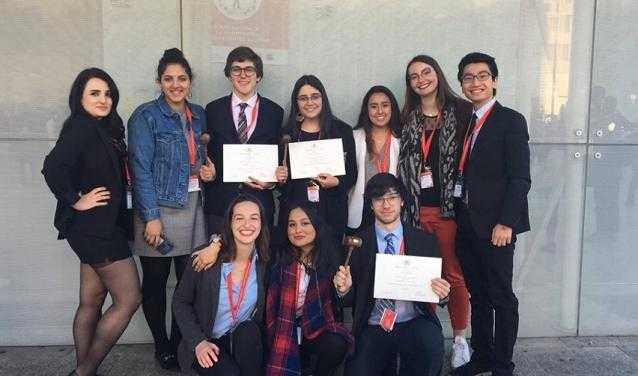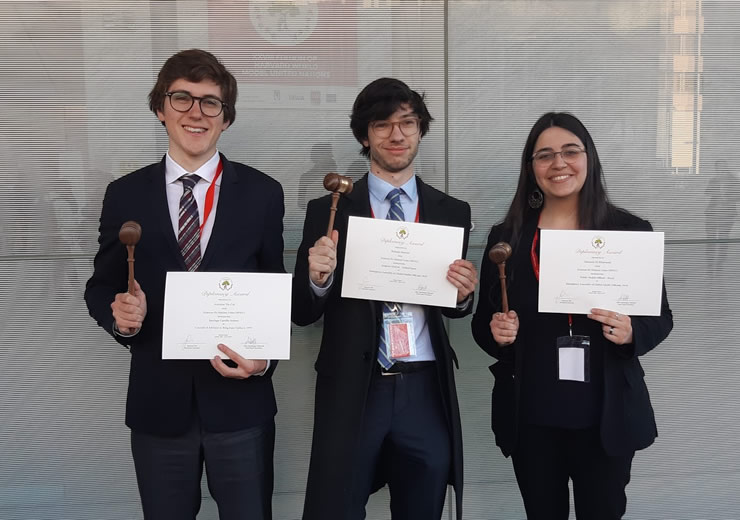Home>International Relations In Practice

12.06.2019
International Relations In Practice
Sciences Po pour les Nations Unies is an association which centres itself around all things international relations and diplomacy. The association has enjoyed great success at the recent WorldMUN, with three students Antoine Da Col, Roland Martial, and Mounia El Khawand, all winning prizes. We met Eve de Seguins Pazzis (president) and Chloé Bernard (vice president) to find out more.
Can you tell us a bit about the association?
Eve de Seguins Pazzis: Sciences Po pour les Nations Unies is a student association, created about 10 years ago at Sciences Po, which focuses on the United Nations and in a more general sense diplomacy and international relations. When it was first created there were two separate associations, one which was more centred around simulations - what we call MUNs, Model United Nations, and all of the training surrounding it. The other association organised diplomacy events and talks on the UN and international relations. Later on these two associations fused and now both activities form part of the one association.
What is an MUN? What does the team do during the event?
Chloé Bernard: MUN stands for Model United Nations and they are simulations of the UN conferences. Each student represents a country on the UN committee. The committees in the UN can be very varied, for example UNESCO, the Security Council, UNAP for the Environment. The main aim for the students representing these committees is to write a resolution, like at the UN, defending the position of the country that they represent on a given topic.
EdSP: This year we have taken part in 6 MUNs: 3 abroad and 3 in France. This year they were in Cambridge, London, and Madrid, and in France we went to Reims, Le Havre etc.
How is it judged? Under what criteria are the prizes awarded?
CB: Two judges which we call chairs moderate the debate and decide at the end who deserves recognition for their diplomacy skills, for their multilateralism... For example, somebody who has helped move the debate forward or contributed to writing the resolution and through so doing, has tried to bring countries together.
EdSP: There are three types of prizes: the first prize is called the position paper, which is a 1-2 page summary, sent by the delegates in advance to their chair, which outlines the position of the country on a certain subject. Then there is the second prize which is called best delegate and which is usually given to two delegates per committee. They are often people who have contributed in an efficient manner to advance the debate and who have actively participated in creating the resolution. The third prize is awarded when the results of the simulation are announced; after announcing the two other prizes they name the two delegates who are distinguished in one way or another.
What awards did Sciences Po students win?
CB: We won the Diplomacy Award which is the most prestigious award at WorldMun and it’s fairly similar to the award “Best Delegate” at other conferences. It’s called the diplomacy award, though, because it puts emphasis on the diplomacy skills of the student. It is not necessarily the people who speak the most who win the prize at the end, rather, the winner is distinguished by their desire to construct something working with the other delegates, to develop a resolution which everybody can agree with - making concessions, working in a team, etc.
EdSP: It’s more realistic that way - some delegates might be very skilled but if, for example, they are representing North Korea they could win the prize for Best Delegate but they won’t have been diplomatic in the role they were playing.
CB:The prizes are important and it’s impressive on a professional level because it shows that you have a range of skills: public speaking, English - because everything is done in English, diplomatic skills to create a consensus. It’s also an experience which helps to act as an indicator for whether we might want to work in international diplomacy or at the UN in the future.

(Antoine Da Col, Roland Martial, and Mounia El Khawand, winners of prizes at the WorldMUN)
What are the challenges for students who participate in MUNs?
EdSP: Participating in MUNs is very expensive - the price of the conference alone is €100 ( at the WorldMUN it was €120) and then on top of that you have to factor in transport, accomodation and often the socials, which aren’t included in the conference price. For 3 day trips this is very expensive. For this reason, this year, we have started to develop a scholarship system which has relieved some of the financial burden for around 10 students for the three conferences we participated in abroad; these scholarships have financed around 50% of the costs. At the moment we have financed the scholarship by selling jumpers, registration fees for events - which usually cost €5. We are also currently preparing for next year and developing our communication strategy to look for corporate sponsors.
CB: It is something which is very important to us, that is to say, making access to MUNs more democratic and allowing people from all financial backgrounds to participate. We know that it has helped because 4 people benefited from the scholarship at the WorldMUN and 7 for the conference in Cambridge. The scholarships are awarded on social guidelines but also based on involvement in the association - for example people who attended training and who were really motivated to attend these conferences.
What is your favourite thing about the association?
CB: I have really liked having the two sides of the association, the MUN part and going to MUN. It was a great experience to represent Poland on the Security council on the Israeli-Palestinian conflict. I found it very stimulating. We also were very lucky with some of the speakers we got to meet at our events: diplomats, and professionals in the world of international relations.
EdSP: I agree with Chloe on that - for me it was an absolute pleasure to participate and to coordinate the two poles.
What are your hopes or goals for the association in the future?
EdSP: At the moment we are handing over to the next committee but we have a few thoughts about what we would like to see. Firstly, we would like to organise training in French as well as English as this would help students who feel less comfortable with English to participate. It’s true that normally MUN conferences are entirely in English so French is not at all the priority language. The second big project, is without a doubt, the scholarship system. We hope to find sponsors so that students do not have to pay out of their own pocket to attend this kind of conference. We know that the next WorldMUN will be in Tokyo and so it would be great if we could have sponsors to help us send everyone who wants to attend!
Learn more
- Association Sciences Po pour les Nations Unies
- Learn about the Paris School of International Affairs (PSIA)
- Culture, athletics, and associations at Sciences Po
Related Articles
- Article on the Jeunes Européens at Sciences Po: Erasmus Generation